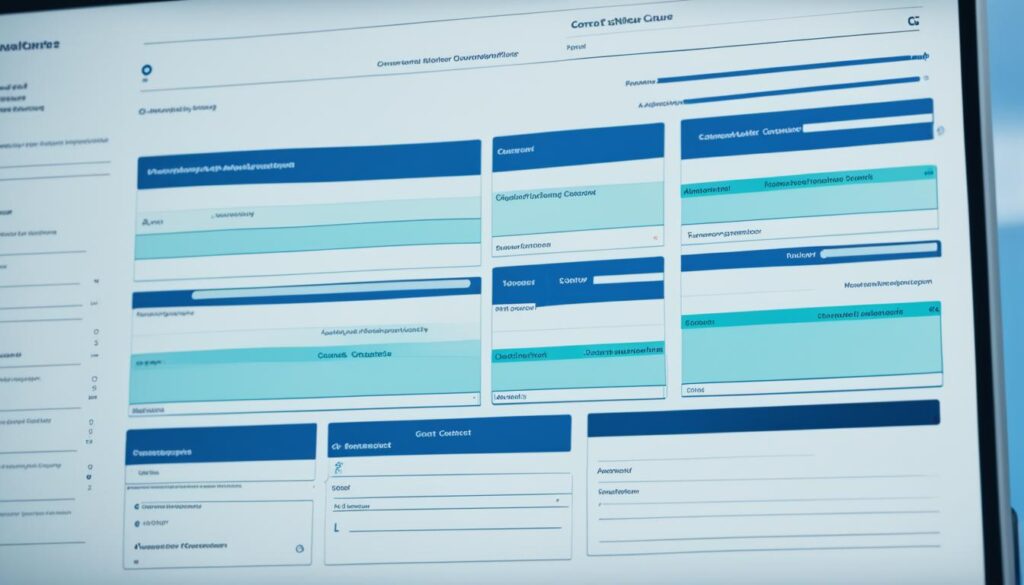Artificial intelligence (AI) is changing the legal world. It provides free tools and solutions that give big benefits. Legal pros can now use AI to make tasks easier, work faster, and be more accurate. From checking documents to doing research, AI is changing how things are done.
This article looks at how AI is growing in the legal field. It talks about the good things that come with using free AI tools. We’ll also cover how it affects learning new things and staying safe online. So, let’s dive into AI’s role and its impact in the legal industry.
Key Takeaways:
- Artificial intelligence is making big changes in law, with free tools that help work faster and better.
- Free AI tools are great for tasks like document checking, research, and finding important information.
- AI is changing the way legal pros learn and get used to new things in their jobs.
- Staying safe and keeping information private is very important when using AI in law.
- The legal future is bright with AI’s power to change how things are done.
The Rise of Artificial Intelligence in Legal Practices
Artificial intelligence (AI) is changing the game in law. It uses smart math and learning to do tasks that usually need a person. This tech was once just a dream, now it’s vital in the law world.
Defining Artificial Intelligence in Law
AI is now a big part of law, changing how attorneys work. It uses fancy math and learning to do repeat tasks, so lawyers are more efficient and accurate. By using AI, legal teams can work better and make smarter choices.
The Evolution from Traditional Practices to AI Integration
AI has completely changed how the law works. Lawyers used to do everything by the book – researching, reading documents, and studying cases. Now, AI helps them quickly tackle lots of data, make sense of tough legal questions, and find key insights.
“AI is revolutionizing the legal industry by streamlining processes and freeing up time for higher-value tasks such as critical thinking and advising.”
AI now helps with lots of legal jobs like managing documents, sorting contracts, and checking rules. These tools are a “must-have” for legal pros, making their work faster and more accurate.
Workflow Benefits: Efficiency and Accuracy
Adding AI to legal work makes everything flow better. It boosts how fast things get done. With AI doing the heavy lifting, there’s less manual work for lawyers. This gives them more time for important stuff.
Also, AI means less chance for mistakes. Its super-smart algorithms can go through huge piles of data. This helps make sure legal advice and decisions are spot on.
AI is reshaping the legal field. It’s making legal work smoother and more reliable. With AI on their side, legal teams can up their game, be more efficient, and serve their clients better.
Generative AI: Transforming Document Processing and Review
Generative AI is changing how legal documents are handled. It brings new tools for legal experts, improving how they work.
These AI tools can do many tasks on their own. They handle things like classifying documents, checking them for issues, and looking over contracts. This speeds up work and makes it more exact.
Thanks to generative AI, legal work becomes quicker and more precise. What once took hours is done much faster. This cuts down mistakes and lifts overall work quality.
Generative AI lets legal pros put more focus on big-picture stuff. They can spend more effort on creative problem solving and guiding clients. This makes their services better and helps law companies work faster for their clients.
These AI tools also make team work better. They make sharing and working on documents easier. This boosts how well teams work together and share knowledge.
“Generative AI tools have the potential to transform the legal industry by revolutionizing document processing and review.”
Generative AI is revolutionizing how legal documents are handled. It equips legal experts with powerful tools for better, quicker, and smarter work.
| Advantages of Generative AI for Document Processing and Review | Benefits |
|---|---|
| Automated document classification | Time savings and reduced human error |
| Efficient due diligence | Faster processing and improved accuracy |
| Contract review and management | Streamlined processes and enhanced collaboration |
| Compliance assistance | Minimized risks and improved regulatory compliance |
The table above points out the benefits of generative AI in the legal field. It leads to better efficiency, accuracy, and teamwork. This improves the quality of legal work.
Legal Tech and AI Solutions for Enhanced Due Diligence
Legal tech solutions and AI are changing how due diligence works, especially in M&A deals. AI tools bring advanced features to the table. They help improve how fast and well legal professionals understand information. This means they can make decisions quicker and more accurately.
Accelerating M&A Due Diligence with AI Tools
In M&A transactions, due diligence is key. It helps look at risks and the rewards of a deal. Normally, this means looking through many documents, which is slow work.
But thanks to AI, lawyers now have tools that can check heaps of data quickly. These tools pull out important bits, letting lawyers focus on big-picture thinking. This makes the whole due diligence process much faster and efficient.
AI can also find potential problems, like not following the rules, or legal issues in contracts. Using AI in due diligence means catching and dealing with these risks faster. This can lead to smoother and more successful M&A deals.
The Impact of AI on Risk Assessment and Management
AI is changing how we look at and manage risks in the legal field. It can sift through lots of data. Then, it uses smart math to guess what risks could pop up and what they might mean.
Now, lawyers can use AI to spot and deal with risks before they get big. This lets them handle risks in a more planned-out way.
AI tools in risk check look at past data and rules to find any weird happenings or big risk spots. This lets lawyers make decisions based on facts. They can then pick the right ways to lower risks.
Plus, AI is great at keeping an eye on legal rules and changes. It helps companies avoid breaking laws, which can save a lot of trouble.
Using AI for risk means better protecting what’s important to clients. It also helps manage resources better and choose the best paths. In the end, it can make businesses do better.
| Benefits of Legal Tech and AI for Enhanced Due Diligence |
|---|
| 1. Accelerated due diligence process |
| 2. Increased accuracy and efficiency in document review |
| 3. Enhanced identification and mitigation of potential risks |
| 4. Data-driven decision-making for successful M&A transactions |
| 5. Continuous monitoring and analysis of regulatory compliance |
| 6. Proactive risk assessment and management |
As our legal system keeps changing, using AI for better due diligence is the future. AI can make due diligence smoother, help check risks better, and lead to good results for clients.
Free Legal Artificial Intelligence and Its Workflow Advantages
Free legal artificial intelligence is great for law pros. It uses smart tech to quickly check a lot of legal info. This saves time and lets lawyers focus on more important work.
Improving Legal Research with Smart AI Algorithms
AI has changed how lawyers do research. Free AI tools can search lots of data fast. They find the important info, like relevant cases, and give clear summaries. This helps lawyers understand the law on their cases better.
Free AI tools make research easier. They let lawyers search with specific questions or legal terms. This cuts down on time spent looking for info. It helps lawyers make smart choices quickly.
AI tools also keep lawyers up-to-date with legal news. They use machine learning to follow new laws and cases. This means lawyers always know if something new might affect their work.
AI-Powered Contract Analysis for Accuracy and Speed
Looking at contracts can take a lot of time. AI makes this process faster and more accurate.
AI tools can check contracts against standards. They find important parts and potential problems. This kind of review is very thorough.
AI makes contract analysis faster and more reliable. It lets lawyers focus on more important things. It also helps catch mistakes, which can avoid problems down the road.
AI tools even help manage contracts better. They track important dates and check if all parties are following the rules. This makes handling contracts easier for lawyers.

Overall, free AI tools are a big plus for lawyers. They improve research and contract review. This makes legal work more efficient and accurate.
Knowledge Management and AI: A New Era for Legal Firms
AI is changing how knowledge is managed in legal firms. It’s creating a new era of working smarter and together. With AI tools, legal teams can keep and share information better. This helps in solving problems and working together across departments.
Systems using AI are key in finding and using the work of legal pros. They make finding the right info faster. This leads to better and quicker ways to solve legal and business problems.
This image shows how AI is changing knowledge management. It blends tech with legal skills seamlessly.
Onboarding and Continuous Learning through Legal AI Applications
Legal AI applications are key in getting new legal pros up to speed and helping them learn continuously. They offer quick, simple ways for legal pros to pick up new skills and knowledge. This means less time and money spent on training.
They also give chances to practice skills, cutting down on the need for more training.
Facilitating Faster Adoption of Legal Practices with AI
AI in law makes picking up new tasks quick and easy. It fits into workflows smoothly, making new team members useful faster. Automation and AI assistance quicken the learning process, improving efficiency.
Hands-On Skill Development with AI Legal Tools
AI legal tools give opportunities to practice skills. They create a safe, simulated space for professionals to fine-tune their abilities.
This method speeds up skill growth. It produces more skilled and confident legal experts.
| Benefits of Onboarding with AI | Skill Development with AI Tools |
|---|---|
| 1. Faster adaptation to new practices | 1. Practical skill development in a simulated environment |
| 2. Increased productivity and efficiency | 2. Refining expertise without high-stakes consequences |
| 3. Reducing the need for extensive training programs | 3. Accelerated learning and confidence building |
| 4. Seamless integration into existing legal workflows | 4. Enhancing problem-solving and critical thinking abilities |
Navigating Legal Complexities with AI’s Plain-Language Proficiency
AI’s ability to simplify complex legal terms is a big help. It lets those not well-versed in law easily ask questions. Then, it finds answers in legal documents. This makes finding info and making strong arguments much quicker.
With AI, legal pros don’t need to know every legal term. They can just ask questions like they would a person. This makes their work simpler and more user-friendly.
“Using AI’s plain-language proficiency, legal professionals can easily navigate through intricate legal frameworks and statutes, allowing them to stay ahead in an ever-evolving legal landscape,” says Jane Thompson, a legal technology expert.
AI’s ability to understand regular language helps explore tough legal topics. Lawyers can ask questions to understand laws better or find ways to solve tough legal cases. The AI then sorts through info and explains the answers found.
This kind of AI saves lawyers a lot of time. Instead of reading loads of legal documents, they just ask the AI. It quickly finds what they need. This makes their work faster and helps them do better for their clients.
AI is changing the game for lawyers. It helps them deal with complex legal stuff easily. By using AI, they can work faster, do better research, and give great legal advice to those who need it.
Ensuring Security and Privacy in the Age of AI Legal Services
In today’s world, keeping information safe and private is key, especially in AI legal services. For those of us in law, it’s vital to make sure our clients’ info stays confidential. This means using AI tools that are secure with strong data protection.
Maintaining Client Confidentiality with Secure AI Platforms
Choosing the right AI platform for law is important. It must have top-notch security to keep our clients’ data safe. These systems use advanced ways to lock up information, making sure no one else can see it.
It’s also critical that only the right people can see this data. By using things like multi-step logins and setting which team members can view what, we lower the chance of anyone breaking in. This builds trust with our clients.
Reliability of AI in Handling Sensitive Legal Data
How much we trust AI to work with our data is a big deal. It should be trained well, using lots of different types of data so it’s smart and keeps things private. This is important for making good choices without risking private info.
Looking for AI that has been checked and confirmed to meet high standards can make data security stronger. Keep watching how AI systems are doing and regularly making sure they follow the rules. This keeps data safe and right.
When we make security a top priority in AI legal services, we show our clients we care. This commitment means choosing secure AI and trustworthy systems. It builds confidence and helps keep our legal services solid.

Conclusion
The rise of free legal artificial intelligence (AI) is changing the legal world. It offers great benefits in workflow, changing how legal professionals operate. AI tools make document processing and review much easier. They help in tasks like document sorting, contract review, and compliance, making legal work faster and more precise. Large-scale document analysis and due diligence are also boosted by AI. This speeds up the process, helping with risk management.
AI tools are enhancing legal research and contract analysis as well. They are making things more efficient, accurate, and quick. This allows legal professionals to spend more time on important matters. Onboarding and learning are also becoming easier with AI. New legal workers can quickly pick up new skills. This method is faster than traditional skill-building ways.
AI is particularly good at simplifying legal jargon. It answers tough legal questions in plain language, making it easier for everyone to understand. It also helps in organizing legal arguments and finding resources swiftly.
Keeping AI legal services secure and private is a top concern. Protecting client data is a priority. Secure AI platforms with strong data controls help keep sensitive legal info safe. Reliable data handling is key to avoiding data breaches and maintaining client trust. As AI continues to shape the legal field, its impact is clear.
For further insights on AI’s role in law, check out this scholarly article.

